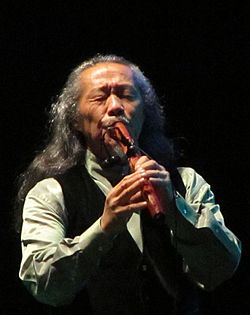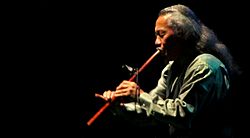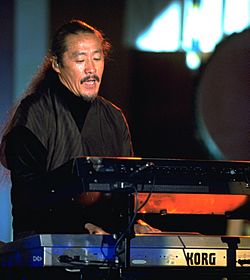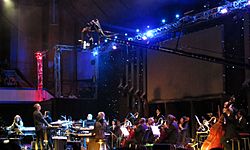Kitarō facts for kids
Quick facts for kids
Kitaro
|
|
|---|---|

Kitarō playing in Tehran, October 2014
|
|
| Background information | |
| Native name |
喜多郎
|
| Birth name | Masanori Takahashi |
| Born | February 4, 1953 Toyohashi, Aichi, Japan |
| Genres | Electronica, world, folk, classical, new-age |
| Occupation(s) | Musician, composer, record producer, arranger |
| Instruments | Keyboards, guitar, bass guitar, Japanese flutes, drums, percussion |
| Years active | 1975–present |
| Labels |
|
| Associated acts | Far East Family Band |
Masanori Takahashi (born February 4, 1953), known as Kitarō, is a famous Japanese musician and composer. He is well-known for his electronic instrumental music. Many people consider him one of the most important artists in new-age music.
Kitarō has won a Grammy Award for Best New Age Album for his album Thinking of You in 1999. He has been nominated for this award 16 times, which is a record! He also won a Golden Globe Award for his music in the movie Heaven & Earth in 1993.
Contents
Early Life and Music Journey: 1954–1976
Masanori Takahashi was born in Toyohashi, Japan. His nickname, Kitarō, means "man of love and joy." His family were farmers who followed Shinto and Buddhism.
When Kitarō finished school, his parents wanted him to get a regular job. But Kitarō loved music and wanted to follow his passion. He eventually convinced his parents to let him pursue music.
In high school, Kitarō played electric guitar in a band. They played American rhythm and blues songs and covers by The Beatles. After graduating, he learned to play drums and bass. Kitarō then moved to Tokyo to join the music scene. There, he discovered the synthesizer, an electronic musical instrument. He loved the warm, "analog" sound of his first synthesizer.
In the early 1970s, Kitarō started focusing on keyboards. He joined a Japanese progressive rock band called Far East Family Band. They recorded four albums together. In 1975, while touring in Europe, he met Klaus Schulze, a German electronic musician. Schulze helped the band and gave Kitarō tips on using synthesizers. In 1976, Kitarō left the band and traveled through Asia, visiting countries like China, Laos, Thailand, and India.
Starting a Solo Career: 1977–1993
After his travels, Kitarō returned to Japan and began his solo music career in 1977. His first two albums, Ten Kai and Daichi, came out in 1978 and 1979. He performed his first big concert in Tokyo.
Music for The Silk Road
Kitarō became famous worldwide for his music for The Silk Road. This was a long-running Japanese TV documentary series that started in 1980. The show explored the ancient Silk Road trade route and how it influenced Japan.
Kitarō composed all the music for the series. He used synthesizers like the Minimoog and Korg. His music for The Silk Road won an award and sold millions of copies. This success brought Kitarō international attention.
Growing Fame and Collaborations
In 1984, Kitarō went on a "Live in Asia" tour. He had to cancel a show in Singapore because of a rule about long hair at the time.
In 1985–1986, he signed a deal with Geffen Records. This helped his music reach more people around the world. His music, with its mix of electronic and acoustic sounds, was often called "new age." Kitarō himself said he just calls it "Kitaro's music." He believes his life views and desire to create positive music influence his work.
In 1987, Kitarō worked with Mickey Hart from the band Grateful Dead on the album The Light of the Spirit. This album sold two million copies! In 1992, he collaborated with Jon Anderson from the band Yes on the album Dream. By 1988, his music sales reached 10 million worldwide.
His album Kojiki, released in 1990, was inspired by an old Japanese story. It became very popular. Kitarō's music for the movie Heaven & Earth won a Golden Globe Award in 1993.
Later Career: 1994–Present
Since 1994, Kitarō has released many albums with Domo Records. Several of these albums, like Mandala (1994), An Enchanted Evening (1995), Gaia-Onbashira (1998), and Ancient (2001), were nominated for Grammy Awards. In 1999, his album Thinking of You won the Grammy for Best New Age Album.
His music for the movie The Soong Sisters (2000) also won awards in Hong Kong and Taiwan.
The Sacred Journey of Ku-Kai Series
Kitarō's music often carries messages of peace. After the events of 9/11, he started a special album series called Sacred Journey of Ku-Kai. He wanted this music to help bring people together around the world. The series was inspired by the Shikoku Pilgrimage in Japan, a journey taken by a monk named Kūkai over 1100 years ago.
Four albums in this series were released between 2003 and 2011. Each song in the series includes sounds from ancient Japanese temple bells, called Peace Bells. These bells come from 88 sacred temples on the island of Shikoku, Japan.
Impressions of the West Lake
In 2007, Kitarō created the music for Impression West Lake. This was a huge outdoor opera directed by the famous Chinese filmmaker Zhang Yimou. The opera showed the history and culture of Hangzhou city in China through music and dance. The stage for the show was actually built just below the surface of a lake! This made for amazing effects with lights and colors. The music album for Impressions of the West Lake was nominated for a Grammy in 2009.
Recent Music and Tours

Kitarō's album Final Call was released in 2013. It was a tribute to his love for nature. In 2014, he released a live album called Symphony Live in Istanbul. This album featured Kitarō playing with a 38-piece orchestra. Both Final Call and Symphony Live in Istanbul were nominated for Grammy Awards, bringing his total nominations to 16! He has also re-released some of his classic albums like Kojiki and Tenku.
From 2007 to 2009, Kitarō went on a "Love and Peace World Tour." He wanted to share his message of world peace through his music. He toured in Southeast Asia, Greece, Japan, and Hong Kong. During his visit to Greece, he met another famous composer, Vangelis.
In 2011, Kitarō went on "The Silk Road – East & West" tour. He donated some of the money from his concerts and CD sales to help with the Tōhoku earthquake and tsunami relief efforts in Japan. He also worked with Dennis Banks, a Native American activist, on the album Let Mother Earth Speak in 2012.
Personal Life
Kitarō has been married several times. He has a son from his first marriage. In the early 1990s, he moved from Japan to the United States. He lived in Colorado for a while, where he had a large home studio. He later moved to California. In 2022, he married Franci Shimomaebara, an artist from Brazil. They had worked together on music before, including a song on his Grammy-nominated album Sacred Journey of Ku-Kai, Volume 1.
Discography
- Studio albums
- Tenkai (1978)
- Daichi (1979)
- Oasis (1979)
- Ki (1981)
- Silver Cloud (1983)
- Toward the West (1985)
- Tenku (1986)
- The Light of the Spirit (1987)
- Kojiki (1990)
- Dream (1992)
- Mandala (1994)
- Peace on Earth (1996)
- Cirque Ingenieux (1997)
- Gaia-Onbashira (1998)
- Thinking of You (1999)
- Ancient (2001)
- An Ancient Journey (2002)
- Sacred Journey of Ku-Kai Vol. 1 (2003)
- Sacred Journey of Ku-Kai Vol. 2 (2005)
- Spiritual Garden (2006)
- Sacred Journey of Ku-Kai Vol. 3 (2007)
- Sacred Journey of Ku-Kai Vol. 4 (2010)
- Final Call (2013)
- Sacred Journey of Ku-Kai Vol. 5 (2017)
Awards and Recognition
Kitarō has received many awards and nominations throughout his career:
- 1985: Nominated for a Hong Kong Film Award for Homecoming
- 1987: Grammy nomination for The Field
- 1990: Grammy nomination for Kojiki
- 1991: Gold Disc Award winner (Japan) for Kojiki
- 1992: Grammy nomination for Dream
- 1993: Golden Globe Award winner for Heaven & Earth
- 1994: Grammy nomination for Mandala
- 1995: Grammy nomination for An Enchanted Evening
- 1998: Grammy nomination for Gaia Onbashira
- Golden Horse Award winner (Hong Kong) for Soong Sisters
- 1999: Grammy Award winner for Thinking Of You
- 2002: Grammy nomination for Ancient
- 2003: Grammy nomination for An Ancient Journey
- 2004: Grammy nomination for Sacred Journey of Ku-Kai Volume 1
- 2006: Grammy nomination for Sacred Journey Of Ku-Kai Volume 2
- 2008: Grammy nomination for Sacred Journey Of Ku-Kai Volume 3
- 2009: Grammy nomination for Impressions Of The West Lake
- 2011: Grammy nomination for Sacred Journey Of Ku-Kai Volume 4
- 2013: Grammy nomination for Final Call
- 2014: Grammy nomination for Symphony Live In Istanbul
- 2017: Grammy nomination for Sacred Journey of Ku-Kai Vol. 5
See also
 In Spanish: Kitarō para niños
In Spanish: Kitarō para niños
- List of ambient music artists
 | Laphonza Butler |
 | Daisy Bates |
 | Elizabeth Piper Ensley |



